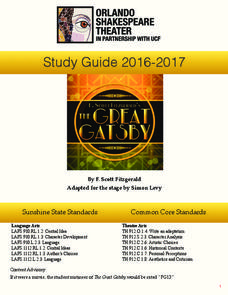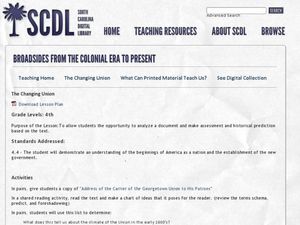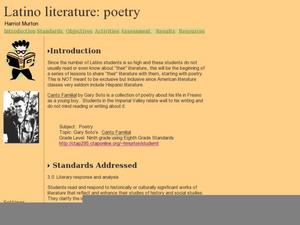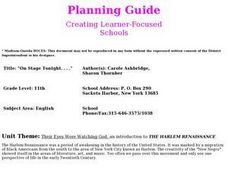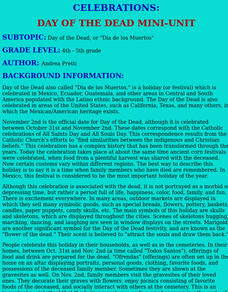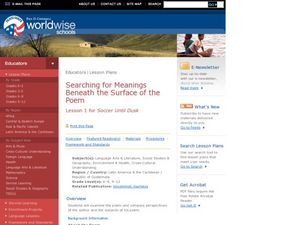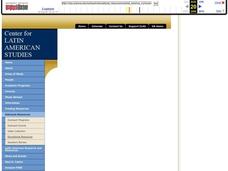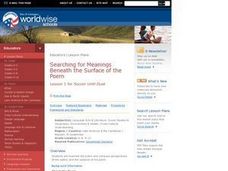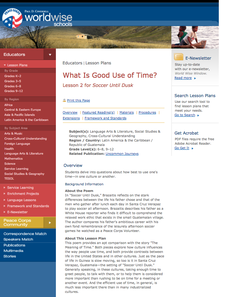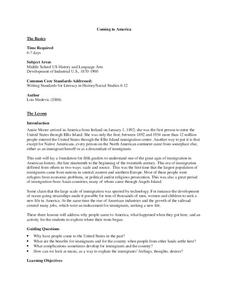National Endowment for the Humanities
The Preamble to the Constitution: A Close Reading Lesson
"We the people of the United States, in order to form a more perfect union..." These familiar lines begin the Preamble to the Constitution, but do learners know what they mean? A close reading exercise takes a look at the language of the...
Orlando Shakes
The Great Gatsby: Study Guide
Uncover the exciting world of the Roaring Twenties with The Great Gatsby study guide. Individuals become critics as they write a review of the production. Scholars also read historical information and analyze the differences between the...
Curated OER
The Changing Union
Fourth graders analyze a document and make assessment and historical prediction based on the text. In this establishment of American government lesson, 4th graders analyze a poem and discuss the climate of the Union in the early 1800's....
Curated OER
A Place for the Birds
Students reflect on bird migrations and develop a project to collect data on bird species from across North America to further investigate the ranges and migrations of common birds. They create a field guide of North American birds.
Curated OER
Trading Off
Students explore how the North American Free Trade Agreement (NAFTA) has impacted the people and economies of North America and Mexico.
Curated OER
Latino Literature: Poetry
Under construction, this lesson focuses on Canto Familia, a collection of poetry about Gary Soto's experiences growing up in California's Imperial Valley. Representative of the experiences of many Latinos, the poems also address themes...
Curated OER
Dragon's Gate
Students read Dragon's Gate as a shared literature book. This lesson plan provides excellent extension activities students can engage in while they are reading, and after they have finished the book.
Curated OER
Thinking About Diversity: One Student's View
Students are asked how would you describe your yourself (Racial/Ethnic). Students read Little Boxes, where it is discussed that the author describes that backgrounds of her parents. They continue to read where they still need to come...
Curated OER
On Stage Tonight . . .
Eleventh graders explore the World Wide Web for information concerning the period known as "The Harlem Renaissance." They study the contributions made by African Americans in the areas of literature, art, and music during this period in...
Curated OER
Ecoregions of Texas
Seventh graders discuss why hunter-gatherers might have favored certain areas in which to live. In pairs, they research specific regions to examine in depth. Students present their eco-region vegetation findings (in this case Central...
National Endowment for the Humanities
Faulkner's As I Lay Dying: Crossing the River
Young scholars analyze the multiple voices in William Faulkner's As I Lay Dying. In this multiple voices lesson plan, students explore the use of symbolism with the narrative voices of the text. Young scholars write a detailed profile of...
Curated OER
Day of the Dead
Students explore Day of the Dead, also called "Dia de los Muertos," which is a holiday (or festival) celebrated in Mexico, Ecuador, Guatemala, and other areas in Central and South America populated with the Latino ethnic background.
National Endowment for the Humanities
Tales of the Supernatural
Scary stuff! Whether approached as the first horror story or a "serious imaginative exploration of the human condition," Frankenstein continues to engage readers. Here's a packet of activities that uses Mary Shelley's gothic...
Curated OER
Searching for Meanings Beneath the Surface of the Poem
Students examine poems from Latin America and the Caribbean. They compare different perspectives and subjects in the poems. They research Peace Corps volunteers as well.
Curated OER
Panama Canal
Students investigate a way to sail a boat around the world without touching land while learning about the Panama Canal. In this Panama Canal lesson plan, students learn about the relationship of socio-political continents and how the...
Curated OER
Searching for Meanings Beneath the Surface of the Poem
Students analyze poetry. In this cultural perspectives lesson plan, students read the poem "Soccer Until Dusk" by Mark Brazaitis. Students analyze the poem and consider the cultural perspective it reveals.
Curated OER
What is Good Use of Time?
Young scholars analyze the best uses of time in other cultures. In this time use lesson plan, students read the poem 'Soccer Into Dusk' and 'The Meaning of Time' as analysis of time usage in other culttures. Young scholars complete a...
Curated OER
Searching for Meanings Benath the Surface of the Poem
Learners read "Soccer Until Dusk". As a class, they discuss the various settings and actions in the poem and discuss the life in Guatemala and compare it with the United States. To end the lesson, they complete a journal reflection...
Curated OER
'Magic' Pablo Lesson
Students examine what goes into hero worship and establishing unlikely friendships. They probe the deeper meanings in "'Magic' Pablo" through small group dialog and use a variety of ways to process the story's meaning. They see the...
Curated OER
What Is Good Use of Time?
Students delve into questions about how best to use one's time-in one culture or another. They explore the kinds of choices students will make about their use of time and consider the statement: "We are shaped by the values of the...
Curated OER
Coming to America
Through this set of three lessons about Ellis Island, class members will learn about why immigrants came to the United States, find out about the difficulties that went along with coming to America, become familiar with the immigration...
Curated OER
In the Wake of Columbus
Students explore how the population decreased in native cultures.
Curated OER
The Mastodon Kill
Using the book Bandits, Bears, and Backaches, learners develop an understanding of the pre-history of Arkansas. They follow the trail ofthe giants mastodons and paleo Indians who lived there long ago. The emphasis on this lesson is on...
Curated OER
Historical Agency in History Book Sets (HBS)
Study historical events by combining the study of historical fiction and non-fiction. Learners read about true past events in historical fiction novels and then research non-fiction accounts of the same events. What are some differences...

